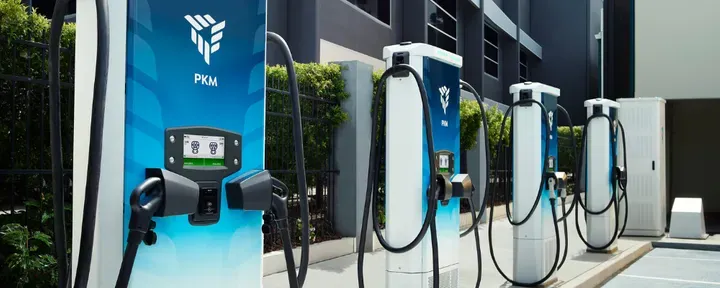In a surprising move that could impact the future of electric vehicle infrastructure in the United States, the General Services Administration (GSA) is reportedly set to shut down its extensive network of electric vehicle chargers. This decision comes as the agency, responsible for managing federal buildings, faces challenges in aligning its resources with current governmental priorities. With a network that includes hundreds of charging stations equipped with 8,000 plugs for government and federal employee vehicles, the implications of this shutdown could reverberate through the federal commitment to renewable energy initiatives. As guidance for deactivation is prepared, the broader context of federal energy policies raises questions about the future of electric vehicles in government operations.
| Category | Details |
|---|---|
| Agency | General Services Administration (GSA) |
| Purpose | Manages buildings owned by the federal government |
| EV Chargers Network Size | Hundreds of chargers with 8,000 plugs |
| Action Planned | Shutdown of entire EV chargers network |
| Notification to Employees | Guidance to deactivate chargers coming next week |
| Regional Instructions | Some offices already instructed to take chargers offline |
| Specific Location Affected | Charging stations at Denver Federal Center |
| Reason for Deactivation | Stations deemed “not mission critical” |
| Government Policy | Reduction of federal support for renewable energy |
| Previous Support | Funding for EV charging infrastructure program |
The Role of the General Services Administration
The General Services Administration (GSA) is an important government agency that helps manage buildings and properties owned by the federal government. This includes overseeing many services that make government operations run smoothly. One of its responsibilities is to provide electric vehicle (EV) charging stations for government-owned cars and federal employees, helping promote the use of clean energy. Recently, however, the GSA has announced plans to shut down its EV charging network.
With hundreds of EV chargers and around 8,000 plugs available, the GSA has played a significant role in supporting electric vehicles. These charging stations are essential for government employees who rely on electric cars. The agency’s decision to deactivate these chargers raises questions about the future of electric vehicle support in federal operations, especially as more people are encouraged to switch to cleaner energy alternatives.
Impact on Federal Employees
The planned shutdown of the GSA’s EV chargers will directly affect federal employees who use electric vehicles for work. According to reports, employees will soon receive instructions on how to deactivate these chargers, which means they will have fewer options for charging their vehicles during the day. This could lead to inconveniences, making it harder for them to rely on electric cars for their daily commutes and work-related travel.
In some regions, offices have already been told to take their chargers offline, leading to confusion and concern among employees. Many federal workers have made the switch to electric vehicles, not just for environmental reasons but also to save on fuel costs. The removal of charging stations could discourage the use of electric cars, which is a step back in promoting sustainable transportation within the federal government.
The Future of Electric Vehicle Charging
The future of electric vehicle charging in the federal government seems uncertain as the GSA plans to deactivate its network of chargers. This decision comes during a time when many are advocating for more support for renewable energy and electric vehicles. Without a robust charging infrastructure, the progress toward a cleaner environment might slow down. The challenge is to encourage more federal agencies to invest in electric vehicle resources instead of reducing them.
As the world moves toward greener solutions, the importance of having reliable charging stations cannot be underestimated. They not only help in reducing carbon emissions but also promote the use of electric vehicles among government employees and the general public. If the GSA’s chargers are taken offline, it could send a negative message about the importance of sustainability and the government’s commitment to eco-friendly practices.
Government Cuts and Renewable Energy
In recent years, there have been significant cuts to various government agencies, which has sparked concerns about the future of renewable energy initiatives. The GSA’s decision to shut down its EV charging stations aligns with a broader trend under the previous administration, which focused on reducing federal support for green energy projects. This approach has raised questions about how the government prioritizes environmental sustainability in its policies.
Programs that once provided millions to enhance electric vehicle infrastructure, like those benefiting Tesla, have faced cuts. These changes can hinder progress in developing necessary resources that support electric vehicles and renewable energy. Advocates argue that continued investment in these areas is crucial for the country to meet its climate goals and encourage the adoption of sustainable technologies.
Local Responses to Charger Shutdowns
The announcement about shutting down EV chargers is causing various reactions at the local level. Some communities are disappointed, as they have been working to promote electric vehicles and reduce air pollution. Local leaders and environmental advocates are urging the federal government to reconsider this decision, emphasizing the importance of accessible charging stations for all electric vehicle users.
In cities like Denver, which rely on the Denver Federal Center’s charging stations, the shutdown could affect many individuals. As local governments push for cleaner air and reduced carbon footprints, the reduction of federal EV support seems counterproductive. Residents hope to see a reversal of this decision, which would align better with community goals of fostering a greener environment.
The Importance of EV Infrastructure
Electric vehicle infrastructure is vital for supporting the growing number of electric cars on the road. Charging stations provide essential services that encourage people to make the switch to electric vehicles, which help reduce greenhouse gas emissions. With more EVs on the road, the need for a network of reliable charging stations becomes increasingly important, not just for government employees but for everyone.
By investing in EV infrastructure, the government can lead by example and show a commitment to sustainability. This support can help build consumer confidence in electric vehicles, making it easier for people to transition away from fossil fuels. The shutdown of GSA chargers sends a conflicting message, as it suggests a lack of support for the very technologies that can help combat climate change.
Frequently Asked Questions
Why is the GSA shutting down EV chargers?
The GSA is shutting down its network of EV chargers because they are deemed ‘not mission critical’ as part of broader cuts to federal support for renewable energy.
How many EV chargers does the GSA operate?
The GSA operates hundreds of EV chargers, offering a total of 8,000 plugs for charging government-owned vehicles and those of federal employees.
What will happen to federal employees who rely on these chargers?
Federal employees will receive guidance next week on how to deactivate the chargers, impacting their access to charging facilities.
Are there any specific locations affected by this shutdown?
Yes, specific locations like the Denver Federal Center have already been instructed to deactivate their charging stations.
What has been the trend in federal support for renewable energy?
There has been a trend of reducing federal support for renewable energy, including cuts to programs that previously funded EV infrastructure.
When will the EV chargers be deactivated?
The chargers will begin to be deactivated soon, with guidance being provided to federal employees next week.
What impact does this have on electric vehicle use?
The shutdown of these chargers could limit access to charging for government vehicles, potentially slowing the adoption of electric vehicles among federal employees.
Summary
The General Services Administration (GSA), which manages federal buildings, plans to shut down its network of electric vehicle (EV) chargers. This network includes hundreds of chargers with 8,000 plugs for government vehicles. Federal employees will soon receive instructions to deactivate these chargers, with some offices already taking action. An internal email revealed that the chargers at the Denver Federal Center will be turned off as they are deemed “not mission critical.” This move follows a trend under President Trump’s administration to cut support for renewable energy and EV infrastructure.






